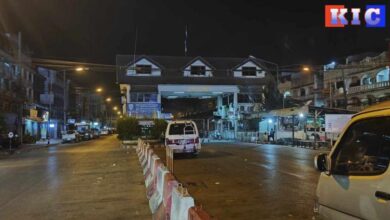International Day of the World’s Indigenous Peoples – Karen Community Groups Want Respect, Management Rights and Governance Over Ancestral Territories

Karen environmentalists demanded the Burma government “to respect and honor indigenous Karen peoples’ governance and management rights over their ancestral territories.”
The Salween Peace Park Committee (SPPC) and Karen Environmental and Social Action Network (KESAN) released a media statement to commemorate International Day of the World’s Indigenous Peoples on August 9, 2018, the 11th anniversary of the UN Declaration on the Rights of Indigenous Peoples (UNDRIP). The joint media statement said “war-displaced Karen communities and their allied civil society organizations gathered in Ei Tu Hta Displaced Camp, Mutraw District, to celebrate the International Day of the World’s Indigenous Peoples.
The KESAN statement noted that despite – “generation after generation, indigenous Karen communities sustainably coexisting with the lands, waterways, and forests around them” – war with the Burma Army had caused massive displacement and suffering.
KESAN explained that after “decades of armed conflict, displacement by large-scale hydropower projects, and the destruction of their ancestral forests by illicit extractive and trafficking activities” Karen people have seen enough destruction of their lands and communities.
“Today, our indigenous Karen communities demand that the Burmese government honor the global consensus on the rights of indigenous peoples and a universal framework of minimum standards for their survival, dignity and well-being.”
KESAN and SPPC also used the commemoration event to used release a Karen language report – Studying Orchids, Enriching Lives – written by an “all-women research team of indigenous Karen community members.”
The SPPC and KESAN joint statement pointed out the “women worked for more than four years to document the existence of endangered orchid species for the very first time in the Kheshorter and ThawthiPwawghaw Community Forests in Southeast Burma. The research team documented 121 species of wild orchids, some of which are threatened, are rare or unknown species.”
The research “findings demonstrate the valuable contribution that indigenous knowledge plays in the conservation of nature and biodiversity, and the key role that Karen women play as stewards of this knowledge.”
The commemoration event included panel discussions, cultural and drama performances, a photo exhibition and a documentary screening.
KESAN said the “Karen community-led efforts are part of the Salween Peace Park (SPP), an initiative founded upon the principles of indigenous community-led conservation. Such areas are often referred to as “Indigenous Peoples’ and Communities’ Conserved Territories and Areas” (ICCAs).”
The SPPC and KESAN statement explained that the Salween Peace Park “covers a 5,400 km2 area, including Karen ancestral territories, wildlife sanctuaries, forest reserves, sacred sites, and community forests. Establishing the SPP involves the mapping and securing of customary land and natural resources rights, strengthening the voices and resilience of the displaced communities during the fragile peace process, and the promotion of cultural and environmental education.”
The statement said the “SPP works towards achieving ‘inclusive conservation’ and cultural preservation, while building peace through recognition of indigenous Karen people’s rights to self-determination over their ancestral territories in Mutraw District of Kawthoolei, Southeast Burma. The SPP is part of a broader international movement that advocates for state governments’ inclusion of ICCAs as a protected area classification along with specific legal frameworks. This would support the legitimate ICCA custodian’s authority to sustain biodiversity and environment-friendly livelihoods, as well as to prevent and respond to threats.
The KESAN and SPPC statement urged the “Burmese government to embrace this bold bottom-up community-led conservation approach. In particular, we urge the government to reorientate the “Ridge to Reef Project” in the Tanintharyi Region to this approach. The Ridge to Reef is a 1.4 million hectare (3,459,475 acres) conservation project which, if implemented, would overlap with huge tracts of land and territories that are traditionally held and managed by indigenous and local communities in Tanintharyi Region.”
The KESAN and SPPC urged the “Burmese government to respect and honour indigenous Karen peoples’ rights, enshrined in the UNDRIP, and to work towards mutual benefit by recognizing indigenous Karen people’s governance and management rights over their ancestral territories and their efforts to protect Burma’s environment and biodiversity.”
KESAN and SPPC called for the recognition and support for indigenous women’s’ in the conservation governance and to let them “meaningfully contribute their unique knowledge.”




